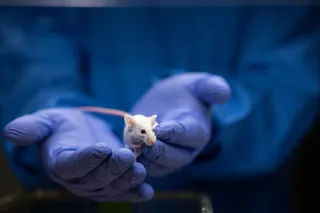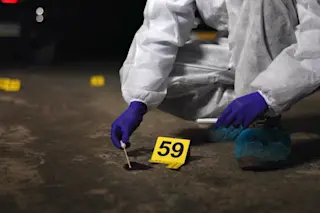Some people say they can smell insects, while others don’t detect any smell from them at all. And even those who do smell bugs often disagree on what a given type of insect smells like. If you don’t believe me, just search the topic on social media; you’ll find some lively discussions.
But when you know how the sense of smell works, variations in whether or not people smell bugs — or variations in how they smell anything else, for that matter — isn’t surprising.
When we smell something, we’re breathing in molecules that are picked up by odor receptors located on neurons (olfactory sensory neurons, or OSNs) that line the nasal cavity. These odor receptors are the first-line sensors that detect odors in our environment, explains Dennis Mathew, a neuroscientist at the University of Nevada, Reno, who studies olfaction at the cellular and molecular levels.
Messaging Scents to the Brain
There are roughly 10 million OSNs lining the nasal cavity, and each one expresses one of approximately 400 types of odor receptors. When it comes to detecting scents, however, not all 400 types necessarily come into play for each scent, says Mathew.
Instead, a select few OSNs respond depending on which chemicals are present in the scent. Some chemicals can bind to multiple odor receptors, activating more than one OSN, while others may activate only specific ones.
When these OSNs are activated, they pass the message on to the brain, which interprets one set of molecules as, say, fresh coffee, another as a wet dog, and just maybe, one set as an ant or a ladybug. But not everyone’s receptors are the same.
Some people, for example, may not have the combination of odor receptors needed to detect a smell that another person easily picks up on. That’s due in part to genetics, says Mathew. There are genetic differences in the number and types of sensors we have, and that could affect what we can smell and how sensitive we are to various smells.
“For example, one particular sensor may be crucial to sensing the smell of a rose,” says Mathew. “And you may have a human who has a genetic polymorphism in the gene that encodes that particular sensor and may not express enough of those, so they may have a different perception for the smell of a rose.”
Read More: Our Sense of Smell May Be More Powerful Than We Think
Insulin Plays a Role in Scent Detection
But what we smell and don’t smell, and how our brain interprets those smells, is influenced by a lot more than those neurons. For example, your sense of smell is different when you’re hungry, says Mathew.
“Don’t you smell that pizza a little differently when you’re hungry than when you’re not?” he asks.
That difference in the pizza’s smell may be down to the hormone insulin. The part of the brain that is involved in processing smells is filled with insulin receptors, and research in Mathew’s lab is finding that insulin signaling has a lot to do with the sense of smell.
The sense of smell is also associated with learning and memory. A bad experience associated with a smell can encode that smell in your memory, Mathew says. And that might be one reason some people smell insects and others don’t.
Say you once stepped on an ant bed and got lots of nasty bites. You might be more likely to remember the smell of the ants than someone who had never had a close encounter with the little biters.
Sense of Smell and Neurodegenerative Disease
There are plenty of mysteries still to unravel about the olfactory system. One of them has to do with the relationship between neurodegenerative diseases and the sense of smell.
A growing body of research suggests that the sense of smell is one of the first senses to be lost when individuals develop a neurodegenerative disease, such as Parkinson’s or Alzheimer’s disease. No one yet knows exactly what the connection is, says Mathew.
He does make clear, however, that failing a smell identification test, such as UPSIT, a test developed at the University of Pennsylvania, and widely thought of as the gold standard in olfactory testing, doesn’t mean you’ll definitely end up with a neurodegenerative disease. It just means you might be at higher risk.
It’s not surprising that some people can smell bugs and others can’t, or that ants smell like cinnamon to one person and like vanilla to another. The sense of smell is complex and fascinating — and in many ways still mysterious.
Read More: Why Are We Afraid of Bugs?
Article Sources
Our writers at Discovermagazine.com use peer-reviewed studies and high-quality sources for our articles, and our editors review for scientific accuracy and editorial standards. Review the sources used below for this article:
Scientific Reports. Mechanism underlying starvation-dependent modulation of olfactory behavior in Drosophila larva
Scientific Reports. The role of insulin sensitivity and intranasally applied insulin on olfactory perception
International Journal of Molecular Sciences. Neurons, Nose, and Neurodegenerative Diseases: Olfactory Function and Cognitive Impairment















